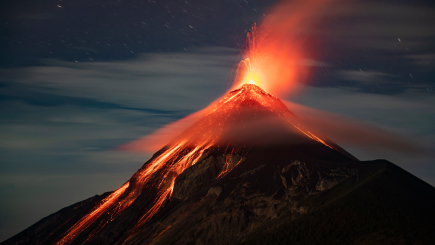
Learn about volcanoes with online courses and programs
Learn to predict and mitigate volcanic hazards, safeguard communities, and preserve the natural beauty that volcanoes bring to the world. Learn about volcanoes with online courses delivered through edX.

What are volcanoes?
Volcanoes are one of nature's geological wonders that have fascinated humanity for centuries. At their core, volcanoes are openings in the Earth's crust, allowing molten rock, ash, and gasses to escape from the Earth's interior to its surface.
Volcanic eruptions occur when pressure within the Earth's mantle forces magma to rise and find a way out. This process is responsible for the formation of mountains, islands, and even massive calderas.
The defining feature of a volcano is its vent, or the opening through which volcanic materials are ejected. When magma erupts from this vent, it can lead to a variety of volcanic landforms, including shield volcanoes, stratovolcanoes, and cinder cone volcanoes.1
Browse online volcano courses
Related Topics
Volcano course curriculum
In an online course focused on volcanoes, participants can learn a wide range of topics related to volcanic activity and volcanology. Subjects that can be covered in these courses include:
- Volcanic geology: Investigate the formation and characteristics of various types of volcanoes, volcanic rocks, and the geological processes associated with volcanism.
- Volcanic hazards: Learn about different types of volcanic hazards, such as lava flows, pyroclastic flows, ashfall, and volcanic gasses.
- Eruption prediction: Study the signs and signals that indicate an impending volcanic eruption, as well as the methods and technology used for prediction.
- Volcanic monitoring: Explore techniques for monitoring volcanic activity, including seismology, gas measurements, and remote sensing technology.
- Case studies: Delve into case studies of significant volcanic eruptions, such as Mount Vesuvius, Mount St. Helens, or recent eruptions, to understand their impact and lessons learned.
- Environmental impact: Learn about the environmental effects of volcanic eruptions, including impacts on climate, ecosystems, and human communities.
Online courses that focus on volcanoes can vary in depth and specialization, from introductory courses suitable for beginners to more advanced programs for those pursuing a career in volcanology. edX offers a variety of educational opportunities for learners interested in studying these topics, as well as a host of other disciplines.A boot camp can provide flexible hands-on learning for those who want to upskill quickly, while executive education courses courses are designed for busy professionals. You can also pursue a more comprehensive curriculum in a bachelor’s degree program or, for more advanced learners, a master’s degree program. Find the right learning path for you.
Explore jobs in volcanology
Studying volcanoes and specializing in volcanology or related fields may open up a number of career opportunities, including:
- Volcanologist: Studies volcanic activity, monitors eruptions, and conducts research to understand and predict volcanic events.
- Geologist: Studies the formation and history of volcanic landforms.
- Emergency management specialist: Develops emergency plans for volcanic eruptions and coordinates evacuation procedures.
- Environmental consultant: Assesses the impact of volcanic activity on ecosystems and human health.
- Tour guide: Leads educational tours for tourists interested in volcanic sites and history.
Each of these roles will have different education and skills requirements. Before deciding on a specific learning path, research the positions you hope to pursue and align your coursework with your career goals.
Are you ready to take the leap into an exciting new career? Start learning today through edX.
More opportunities for you to learn
We've added 500+ learning opportunities to create one of the world's most comprehensive free-to-degree online learning platforms.
Forces of Nature | Volcanoes (2023). National Geographic. Retrieved September 25, 2023.